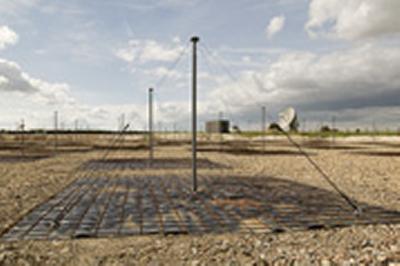Are we alone? Southampton plays key role in new telescope with an ‘ear on the universe’

The University of Southampton has played a key role in the first major radio telescope to be built in Britain for many decades, which will help answer questions such as “Are we alone?” and “How did black holes grow in our universe?”
The telescope, which is part of the European LOFAR (Low Frequency Array) project, will ‘listen’ to the Universe at FM frequencies, helping astronomers detect when the first stars in the Universe were formed and to reveal more about how the Universe evolved.
It was officially opened yesterday (20 September) by Dame Jocelyn Bell Burnell, who discovered the first radio pulsars, at a ceremony at the Chilbolton Observatory, near Andover in Hampshire, which is part of the Science and Technology Facilities Council (STFC).
Professor Rob Fender of the University of Southampton, Principal Investigator of the LOFAR UK project, said: “The most amazing thing is that these small dipole antennas can pick up faint radio signals from over 10 billion years ago, when the universe was a fraction of its current size, and that this signal can be mapped over the entire sky by the telescope without a single moving part.”
LOFAR is a European project being led by ASTRON (the Netherlands Foundation for Research in Astronomy) which when complete, will see over 5,000 separate antennas grouped into ‘stations’ all over Europe, including the Chilbolton Observatory, to form the world's largest and most sensitive radio telescope. LOFAR works at the lowest frequencies accessible from Earth which, combined with the latest in high-tech computing, allows wide areas of the sky to be surveyed opening up new possibilities for astronomers.

The installation of the 96 telescope radio antennas that make up the Chilbolton station was completed by scientists and students from a consortium of universities, including the University of Southampton. Derek McKay-Bukowski, Project Manager at LOFAR Chilbolton, said: “The team working on the project have been great. We’ve had the best of UK scientists and engineers, but also lots of university students too. For them, it has been an amazing learning experience.”
Professor Mike Garrett, General Director, ASTRON said: “The international LOFAR telescope is opening up a new window on the universe - there is a lot of excitement about just what we are going to discover. The LOFAR station in Chilbolton will double the level of detail we will be able to see in the images LOFAR will produce. It’s also fantastic to have the UK astronomical community fully onboard - they will help ensure that this transformational new telescope is fully exploited scientifically – we’re looking forward to the first results.”